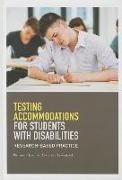Read more
This book offers research-based guidelines for deciding when test accommodations are appropriate for a student with disabilities-depending on the test being taken, the accommodations being considered, and the student's functional skills.
List of contents
Series ForewordPreface- Introduction
- Legal, Procedural, and Ethical Foundations
- Psychometric Foundations
- Disability Conditions and Functional Limitations
- Timing and Scheduling Accommodations
- Response Format Accommodations
- Setting and Presentation Accommodations
- Accommodations and Interventions
- Issues in the Transition to Postsecondary Settings
- Universal Design for Assessment
- Conclusions
Appendix A: Documentation Review in Postsecondary SettingsAppendix B: Professional Development ApplicationsResources for Further ReadingReferencesIndexAbout the Authors
About the author
Benjamin J. Lovett, PhD, is an assistant professor of psychology at the State University of New York College at Cortland, where his research focuses on conceptual and applied issues in psychoeducational assessment and psychiatric diagnosis. Dr. Lovett has more than 50 publications that have appeared in peer-reviewed journals and edited books. He also serves as a consultant to a variety of educational institutions and testing agencies on the topics of disability diagnosis and testing accommodations.
Lawrence J. Lewandowski, PhD, is a professor of psychology at Syracuse University, holding distinction as a Laura J. and Douglas Meredith Professor for Teaching Excellence. Dr. Lewandowski has approximately 100 publications, most of which deal with the study of learning disabilities, attention disorders, and other pediatric neurological conditions. His recent research involves such topics as processing and reading speed in individuals with and without disabilities, extended-time accommodations for students with disabilities, assessment of clinical impairment in attention-deficit/hyperactivity disorder and learning disabilities, and the effects of concussion on children and adults.
Summary
Offers specific guidelines for deciding when accommodations are appropriate for a student with disabilities — depending on the test being taken, the accommodations being considered, and the student’s functional skills. It explains how laws and practices differ for K–12 accommodations versus postsecondary education and workplace accommodations.

